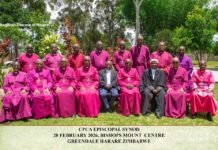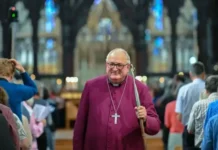CLERGY’S retirement age would be abolished under proposed changes to the legislation that governs their employment by the diocese, a review group has told synod.
Abolishing the Diocesan Stipends Committee and keeping the term of appointment for vicars to 10 years were other key points in the Clergy Legislation Review group’s proposal.
Chair Bishop Alison Taylor briefed representatives at synod last week on the review process, which included changes to fix out-of-date legislation and deal with contentious issues.
A report on the proposed changes was submitted to the 2021 synod but a bill is not scheduled to be introduced until 2022. Synod approved the report and the proposed bill, with several amendments.
The Review project, which began in 2019, is reviewing all diocesan legislation that relates to clergy. It proposes several changes, including:
Removal of the retirement age for parish clergy
Bishop Taylor said the general view in wider society was that a mandatory retirement age was inappropriate. Current legislation provides that vicars and assistant bishops cease to hold their positions on turning 70.
“People are living longer than ever before, and in better health,” Bishop Taylor said.
“When the current diocesan legislation providing that vicars cease office at 70 was introduced in 1971, the average life expectancy in Australia was 71 years, in 2019 it was 83.4 years.”
Bishop Taylor stated that mandatory retirement ages were disappearing across Australia and for non-clergy staff in the diocese. She said having such an age might even be contrary to the law.
Keeping the term of appointment for vicars at 10 years.
Bishop Taylor said the term would not be dropped back to seven, or increased to 15, both of which had been proposed.
Abolishment of the Diocesan Stipends Committee
Bishop Taylor said the report proposed giving responsibility for stipends and working conditions to Archbishop in Council while abolishing the Diocesan Stipends Committee.
She said the committee had served the diocese well for the past 30 years, but the context had now changed significantly.
“Our parish clergy are deemed by Workcover to be employees in a limited sense— that is, for the purposes of their remuneration and for the setting of working conditions that relate to safety— and the employer for these purposes is the Melbourne Anglican Diocesan Corporation,” Bishop Taylor said.
Bishop Taylor said committee’s members would continue their work as part of an Archbishop in Council committee.
Other proposed changes:
- All priests in charge of parishes to be titled vicars, whether they are in a probation period or not, and whether their parish is full or part time.
- Complex and difficult to comprehend legislation to be rewritten to favour plain English and contemporary drafting conventions.
- Parishes to no longer to have to in effect begin a vacancy process as the first step to extending the appointment of the current vicar.
- Deferral of the appointment process for a vacant parish may occur only where it has been agreed to appoint a parish consultant before the parish nominations committee first meets. This is unclear at present.
- Clergy to not be made employees “in the full sense” but rather to remain as office holders.
- Churchwardens to be included in decisions made in relation to vicars who are finishing the probation period of the first parish in which they’ve been in charge, and the decisions made for an extension of appointment after a vicar has been in a parish for their 10-year appointment.
- All appointments for priests in charge of parishes to be by the parish nomination process. There still remain six provisions within the proposed legislation that safeguard the Archbishop’s crucial role in all clergy appointments.
- The only votes on the parish nominations committee to be those of the assistant bishop and the parish nominators.
The motion was that Synod, firstly, receive the report on the review of legislation relating to clergy, and secondly, endorses part two of that report as the basis for the preparation of a bill to be brought to the 2022 ordinary session of Synod. There were a number of amendments.
It was seconded by the Venerable Heather Patacca, the Canon Precentor and Archdeacon of Melbourne.



